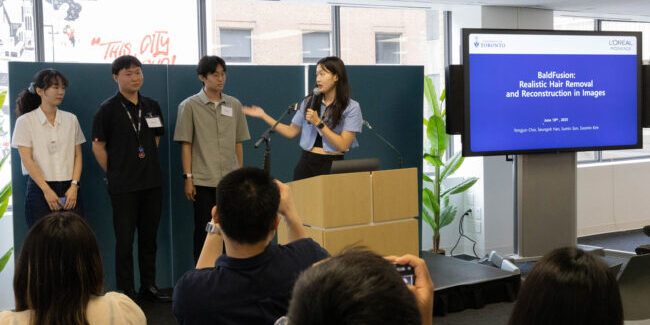Professor Enid Montague (MIE) has been named the new director of the Black Research Network (BRN), a University of Toronto Institutional Strategic Initiative (ISI) launched in October 2021.
Montague, whose research is focused on human factors engineering, will serve a three-year term effective July 1, 2024.
She succeeds Rhonda McEwen, president and vice-chancellor of Victoria University at U of T, who has served as the BRN’s interim director since August 2023.
“I’m honoured to take on the role as the BRN’s new director,” Montague says.
“During the last three years, the BRN has provided its members with incredible opportunities to accelerate their research. It also plays a prominent role in contributing to establishing collaborations, both within the university and its partners.
“I greatly look forward to continuing to build upon this foundation, with new partnerships and opportunities to support the current and next generation of researchers.”
With expertise in human-automation interaction in health care, Montague’s research highlights how new technologies can be used to address inefficiencies and inequities in health care systems, with a focus on increasing access to healthcare.
Montague joined U of T Engineering in 2022 from DePaul University, where she was an associate professor, leading its master of science in health informatics program. Prior to DePaul University, Montague spent almost a decade at Northwestern University as an adjunct associate professor in the Feinberg School of Medicine and McCormick School of Engineering.
Montague has received numerous awards, including an early-career research award from the National Institutes of Health and the Anna Julia Cooper Fellowship. In 2018, she was awarded a Fulbright Award, where she continued research dedicated to improving health-care systems in the United Kingdom.
Montague is also the director of MIE’s Wellness and Health Enhancement Engineering Laboratory (WHEEL), a research group that uses experimental and design methods to understand human-automation interaction.
“I am delighted that Enid will be taking on the BRN’s directorship,” says McEwen, a member of the BRN’s steering committee.
“Enid’s background in engaging with research communities internationally makes them the perfect candidate to lead the BRN as it continues to empower Black researchers to advance knowledge across various disciplines and positions itself as a leading academic research network promoting Black research excellence in Canada.”
As the BRN’s director, Montague will lead the ISI into its new strategic vision. This includes introducing mentorship initiatives to support its members. Montague will also focus on forging international and community partnerships, set to facilitate knowledge exchange, collaboration and opportunities for joint research endeavours.
The first initiative of its kind in Canada, the BRN currently has 228 members at U of T. Now in its fourth year, the ISI has established multiple efforts to advance research support and leadership, with three new research initiatives launched in the past year: the inaugural BRN Faculty Fellows program and two new BRN academic roles under the Black Indigenous Waterways program — a $70,000 postdoctoral fellowship and $10,000 Artist-in-Residence position.
In addition to advancing research agendas, Montague says that she looks forward to continuing to foster community engagement and visibility for Black scholars across the tri-campus.
“The BRN has played a vital role in acting as a meeting place to help Black faculty, librarians and students across the tri-campus connect and find community. This is something that will only get stronger as the network deepens its mission and explores new possibilities,” Montague says.





